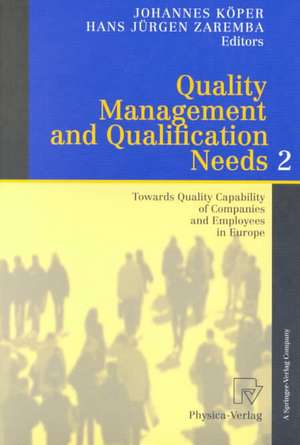Quality Management and Qualification Needs 2: Towards Quality Capability of Companies and Employees in Europe
Editat de Johannes Köper, Hans J. Zarembaen Limba Engleză Paperback – 24 mar 2000
Preț: 645.28 lei
Preț vechi: 759.15 lei
-15% Nou
Puncte Express: 968
Preț estimativ în valută:
123.47€ • 128.92$ • 102.19£
123.47€ • 128.92$ • 102.19£
Carte tipărită la comandă
Livrare economică 04-18 aprilie
Preluare comenzi: 021 569.72.76
Specificații
ISBN-13: 9783790812626
ISBN-10: 3790812625
Pagini: 396
Ilustrații: XII, 380 p. 69 illus.
Dimensiuni: 155 x 235 x 21 mm
Greutate: 0.55 kg
Ediția:Softcover reprint of the original 1st ed. 2000
Editura: Physica-Verlag HD
Colecția Physica
Locul publicării:Heidelberg, Germany
ISBN-10: 3790812625
Pagini: 396
Ilustrații: XII, 380 p. 69 illus.
Dimensiuni: 155 x 235 x 21 mm
Greutate: 0.55 kg
Ediția:Softcover reprint of the original 1st ed. 2000
Editura: Physica-Verlag HD
Colecția Physica
Locul publicării:Heidelberg, Germany
Public țintă
ResearchCuprins
1: Results.- Central results of the sector studies on the metalworking and food industries.- Guidelines for quality-oriented personnel development in small and medium-sized enterprises.- Recommendations for the vocational training in Europe.- 2: Scientific Contributions.- Quality systems and training. The case of Portugal.- Quality management, management and training. A contingency approach.- The use of information technology as a tool for vocational training in quality implementation.- Network installation of regional and European qualification needs analyses - requirements and tasks.- Quality management and environmental management and safety management— what they have in common, future demands on SMEs, possibilities of integrated training.- QM knowledge as a requirement in basic education in Greece.- Quality, qualifications and the attribution of value in work based learning.- Development tendencies of modern plant organisation - tasks of the middle management and conceptual approaches for vocational further education.- 3: Action-Oriented Dialogue with Key Actors.- Questions to key actors in European vocational training (Documentation).- Federal Republic of Germany: 5 Statements of key actors.- Finland: 5 Statements of key actors.- Greece: 5 Statements of key actors.- Ireland: 5 Statements of key actors and 1 summary.- Portugal: 4 Statements of key actors.- Sweden: Summary of statements of key actors.- United Kingdom: 3 Statements of key actors and 1 overview.- Outlook.
Textul de pe ultima copertă
A research network has examined how quality management is implemented in small and medium sized enterprises (SMEs) in Europe and what the consequences are for the qualification needs of employees. The research has taken place within the framework of the Leonardo Da Vinci programme, which is an action programme of the European Commission DG XXII - Education Training and Youth. The survey results in the metalworking and food processing industries are published under the title Quality Management and Qualification Needs 1. Quality and Personnel Concepts of SMEs in Europe".
This book presents conclusions including three parts: "Results" deriving from the sector studies - specialised "Scientific contributions" of network partners - "Action-oriented dialogue" documenting comments of key actors in vocational training from the participating countries.
Special objectives are:
- Support of quality-oriented development of SMEs and their staff
- Support of quality-oriented development of vocational education and training
- Description of implementation requirements including regional aspects
This book presents conclusions including three parts: "Results" deriving from the sector studies - specialised "Scientific contributions" of network partners - "Action-oriented dialogue" documenting comments of key actors in vocational training from the participating countries.
Special objectives are:
- Support of quality-oriented development of SMEs and their staff
- Support of quality-oriented development of vocational education and training
- Description of implementation requirements including regional aspects













